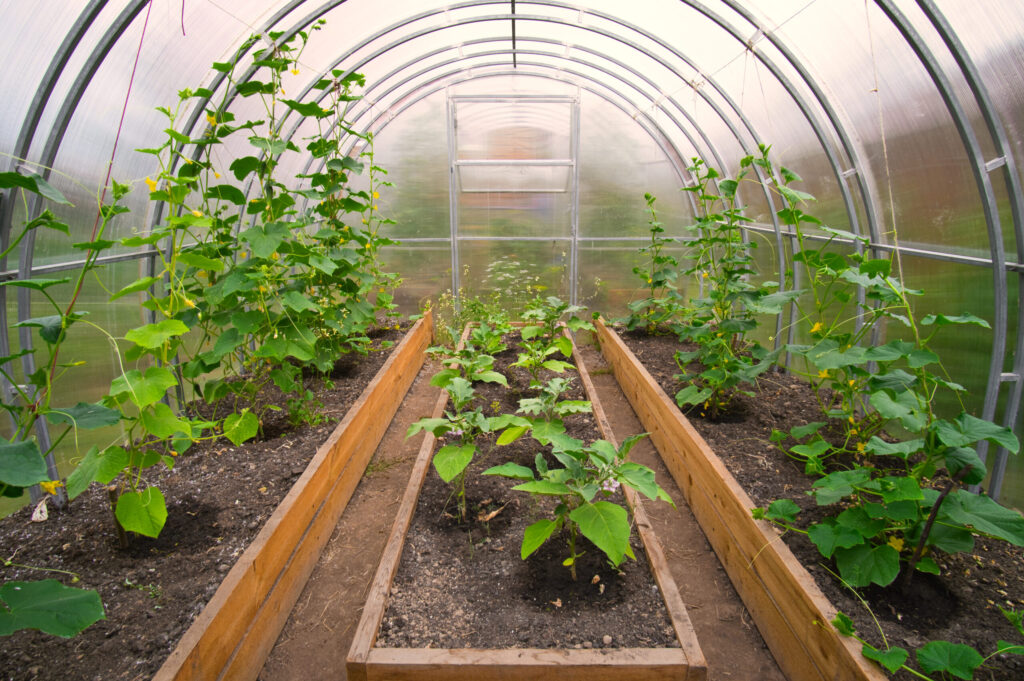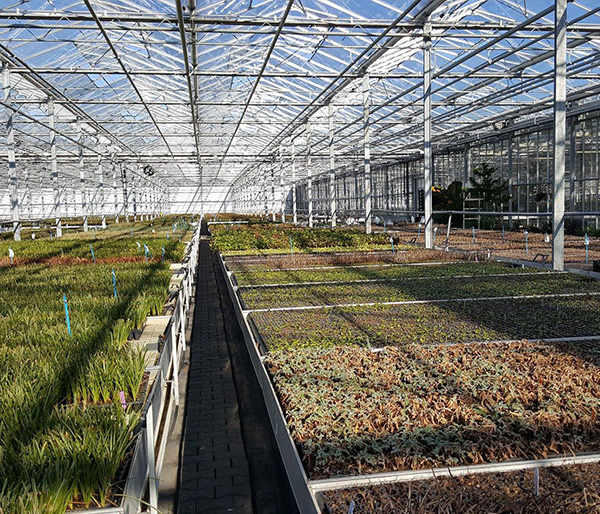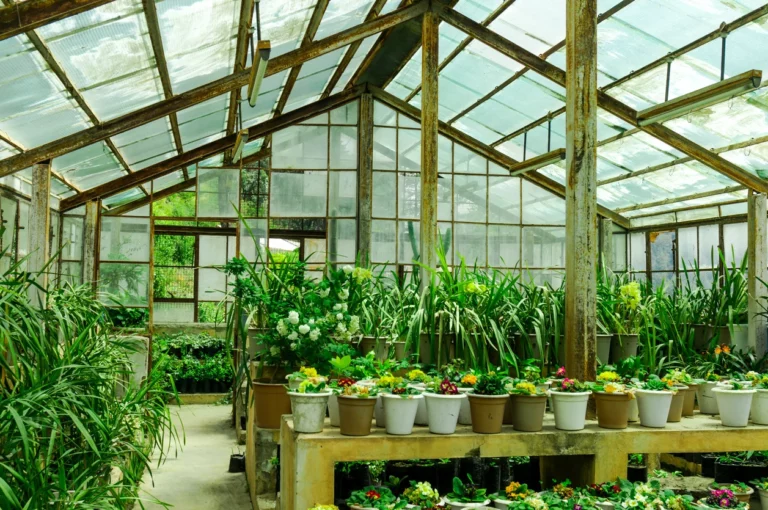Greenhouse-grown and organic refer to different methods of cultivating crops. Greenhouse-grown produce is cultivated in controlled environments, allowing for precise temperature, humidity, and light control. This method often results in efficient year-round production but may use synthetic fertilizers.
On the other hand, organic farming avoids synthetic chemicals, focusing on natural methods like composting and crop rotation. While both methods have pros and cons, the key distinction lies in the approach to fertilizers and pesticides. Greenhouse-grown may use synthetic inputs, while organic relies on natural, chemical-free alternatives.
Greenhouse Grown

Greenhouse grown refers to the cultivation of plants within a controlled environment, typically a greenhouse or a similar structure. This environment allows growers to regulate factors such as temperature, humidity, and light.
In a greenhouse, growers create an artificial yet optimized setting for plant growth. This controlled space enables year-round cultivation, offering protection from adverse weather conditions and allowing for precise management of various growth factors.
Benefits and Advantages
Year-round Production
Greenhouse-grown crops are not limited to specific seasons, enabling continuous production throughout the year. This ensures a more consistent and reliable supply of fresh produce regardless of external weather conditions.
Controlled Environment
Greenhouses provide a controlled environment, allowing growers to fine-tune variables like temperature, humidity, and light intensity. This control enhances crop quality, accelerates growth cycles, and minimizes the impact of external factors on plant development.
Reduced Environmental Impact
Greenhouse cultivation often results in reduced use of water and fertilizers compared to traditional open-field farming. The controlled environment helps minimize the need for pesticides and herbicides, contributing to a more environmentally sustainable approach to agriculture.
Organic Farming
Organic farming is an agricultural approach that emphasizes sustainable and environmentally friendly practices. It avoids synthetic pesticides, fertilizers, and genetically modified organisms, relying on natural processes for crop cultivation.
Organic farming adheres to principles such as soil health, biodiversity, ecological balance, and the use of organic inputs. It prioritizes the well-being of the environment, the health of crops, and the overall sustainability of the farming system.
Benefits and Advantages
Reduced Chemical Use
Organic farming minimizes the use of synthetic chemicals, including pesticides and fertilizers, reducing environmental pollution and potential harm to human health.
The emphasis on natural pest control methods, crop rotation, and composting fosters healthier ecosystems within the farm.
Soil Health and Biodiversity
Organic farming practices focus on building and maintaining soil health through the use of organic matter, cover crops, and crop rotation.
Embracing biodiversity, organic farms often feature a variety of crops and incorporate natural elements like hedgerows and wildflower strips, fostering a balanced and resilient ecosystem.
Healthier Produce
Organic farming aims to produce healthier and more nutrient-dense crops by avoiding synthetic chemicals and genetically modified organisms.
Studies suggest that organic produce may have higher levels of certain nutrients and antioxidants, contributing to potential health benefits for consumers.
Differences Between Greenhouse Grown and Organic
Growing Methods
Controlled Environment vs Natural Conditions
Greenhouse Grown: Involves cultivation within a controlled environment, allowing regulation of factors like temperature, humidity, and light. This artificial setting enables year-round production and precise control over growing conditions.
Organic Farming: Relies on natural conditions and traditional farming practices. Crops are typically grown outdoors, subject to seasonal variations, and depend on natural processes without the use of artificial controls.
Use of Chemicals
Fertilizers, Pesticides, and Herbicides
Greenhouse Grown: May involve the use of fertilizers and pest control measures, but the controlled environment often reduces the reliance on chemical inputs. Integrated pest management is common.
Organic Farming: Strictly avoids synthetic fertilizers, pesticides, and herbicides. Instead, organic farmers use natural alternatives, crop rotation, and companion planting to manage pests and enhance soil fertility.
Sustainability Practices
Environmental Impact and Resource Efficiency
Greenhouse Grown: While it offers advantages like year-round production and reduced environmental impact compared to open-field farming, the energy-intensive nature of maintaining a controlled environment raises concerns.
Organic Farming: Emphasizes sustainability by promoting soil health, biodiversity, and reduced reliance on external resources. Organic practices aim for a minimal environmental footprint, prioritizing long-term ecological balance.
Nutritional Value of Greenhouse Grown Vs Organic
The nutritional value of greenhouse-grown produce versus organic produce can vary based on several factors.
Greenhouse Grown
Greenhouse-grown produce benefits from a controlled environment that allows for year-round cultivation. The precise management of factors like temperature, humidity, and light can contribute to consistent quality.
However, the nutritional content may be influenced by the specific practices employed, such as the type of fertilizers and growing methods. While greenhouse-grown produce is generally reliable and available throughout the year, the nutrient levels may depend on the specific crops and the care taken in their cultivation.
Organic Farming
Organic farming emphasizes soil health, biodiversity, and the avoidance of synthetic chemicals. Studies suggest that organic produce may have higher levels of certain nutrients and antioxidants.
A 2016 meta-analysis of 170 studies compared the nutritional quality of organic and conventional crops. The review found that organic produce had significantly higher levels of certain antioxidants, including anthocyanins, flavonoids, and carotenoids.
The focus on natural and sustainable practices can contribute to the overall nutritional density of organic crops.
However, the variability in soil conditions and the reliance on natural processes may lead to seasonal fluctuations in the availability and nutritional content of organic produce.
Greenhouse Grown vs. Organic Produce – Which Fits Your Budget and Lifestyle?

Cost
Greenhouse-grown lettuce and microgreens often come with a higher price tag, sometimes double or triple the cost of field-grown produce.
Retail prices for greenhouse-grown products can range from $16 to $20 per pound, while California field-grown lettuce sells for $6 to $11 per pound.
Organic produce tends to be pricier due to the absence of economies of scale and subsidies enjoyed by conventional farms, with the average production cost for a pound of tomatoes in the U.S. sitting at approximately $3.50.
Profitability in greenhouse operations is closely tied to efficiency and maintaining full cultivation spaces.
Accessibility
Greenhouse-grown produce guarantees a year-round supply of fresh food. Although some commercial greenhouse growers may use chemical pesticides, smaller growers often opt for natural organic products.
Organic produce, cultivated without chemical fertilizers or pesticides, relies on practices like hand-weeding, crop rotation, companion planting, and organic compost.
It’s important to note that the label “greenhouse-grown” doesn’t automatically imply organic; specific organic growing practices must be adhered to.
In terms of environmental impact, greenhouse cultivation, especially without conventional soil, utilizes up to 95% less water per pound of yield compared to field crops, alleviating strain on natural resources.
FAQ
Does greenhouse mean organic?
No, the term “greenhouse” does not automatically mean organic. Greenhouse refers to the method of cultivation in a controlled environment, but it doesn’t guarantee the absence of synthetic chemicals or adherence to organic farming practices.
Is greenhouse-grown healthy?
Greenhouse-grown produce can be healthy as it allows controlled conditions for optimal plant growth. However, its health depends on factors like the type of crops, cultivation practices, and the use of fertilizers or pesticides.
What is the meaning of greenhouse grown?
Greenhouse-grown means cultivating plants within a controlled environment, typically a structure with transparent walls, allowing sunlight while regulating temperature, humidity, and other factors for optimal plant growth.
Does homegrown mean organic?
No, “homegrown” does not necessarily mean organic. Homegrown simply implies that the plants were grown at home or on one’s property. Whether they are organic or not depends on the cultivation practices and the use of synthetic chemicals.
Does organic mean 100% natural?
While organic products prioritize natural methods, “organic” doesn’t necessarily mean 100% natural. Some approved organic practices may involve natural but processed substances. Organic certification focuses on avoiding synthetic chemicals.
Does organic mean 100% organic?
Yes, the term “organic” on a product label indicates that it meets organic certification standards. For a product to be labeled as “100% organic,” it must contain only organically produced ingredients.
What does 70% organic mean?
A product labeled as “70% organic” indicates that it contains 70% organically produced ingredients. The remaining 30% may include non-organic ingredients that adhere to certain guidelines, but the overall product doesn’t qualify as fully organic.
What is 100% natural vs 100% organic?
“100% natural” implies that all ingredients are derived from natural sources, but it doesn’t guarantee they are organic. “100% organic” means all ingredients are organically produced, adhering to strict organic farming standards.
Final thoughts
In the end, whether you choose Greenhouse Grown or Organic veggies depends on what matters most to you. If you want veggies that look perfect and are available all the time, go for Greenhouse. But if you care about nature, don’t mind some imperfections, and want to avoid chemicals, then Organic is your pick. Both have their good sides. It’s like choosing between reliable and perfect or natural and caring. So, pick what fits your taste and values. Happy eating!”

